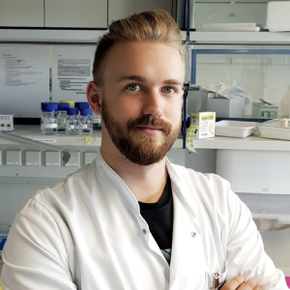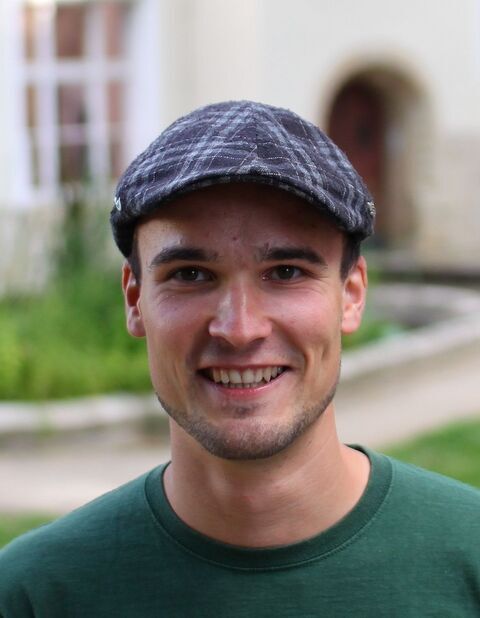Medical Scientist-Programm
Das Medical Scientist-Programms (MSP) fördert die Karriere von nicht-ärztlichen Wissenschaftlerinnen und Wissenschaftlern in der Medizin (Medical Scientists). Es richtet sich an junge Postdocs, dient der Anschubförderung von Projekten und soll die geförderten Wissenschaftlerinnen und Wissenschaftler zur erfolgreichen Drittmitteleinwerbung befähigen. Das MSP ist Teil der kontinuierlichen Förderstruktur für Medical Scientists am Universitätsklinikum Jena.
Im Rahmen des dreijährigen MSP werden folgende Weiterbildungselemente angeboten: ein begleitendes strukturiertes Qualifizierungsprogramm zur Vermittlung methodischer und wissenschaftlicher Kompetenzen, ein Karriere- und Mentoringprogramm zur Unterstützung der persönlichen Karriereentwicklung und die Einbindung der Geförderten in Lehr- und Betreuungsaufgaben für den wissenschaftlichen Nachwuchs.
Alle Doktoranden im geförderten Projekt nehmen verbindlich an einem der strukturierten Graduiertenprogramme der Jena School of Molecular Medicine (JSMM) teil.
Eine aktuelle Ausschreibung ist ab jetzt verfügbar. Die Einreichungsfrist für Ihre Anträge ist der 6. Februar 2026. Die öffentliche Projektvorstellung wird am 19. oder 20. März 2026 stattfinden.
Informationen zu den Bewerbungsunterlagen finden Sie weiter unten.
MSP IZKF - Kollegiatinnen und Kollegiaten
Neue Förderungen aus 2025
MSP 22 - Dr. Josefine Sell

Medical Scientist-Programm 2025
Thema: "Pathophysiological effects of human autoantibodies against the structural protein Caspr2 in the central nervous system"
Zusammenfassung:
Autoimmune encephalitis (AE) with anti-Caspr2 autoantibodies (aAb) affects the central and peripheral nervous system (CNS / PNS), causing diverse symptoms including anterograde amnesia, behavioral disorders, epileptic seizures (CNS involvement), neuropathic pain, and movement disorders (PNS involvement). Previous studies suggest an aAb-mediated disruption of Caspr2 interactions with TAG-1 and Kv1 potassium channels. However, the precise localization and function of Caspr2 in neurons remained unclear and the pathomechanisms underlying characteristic AE symptoms are largely unknown. This study aims to elucidate the impact of aAb on Caspr2 expression, synaptic localization, and its interaction with binding partners using high-resolution imaging. Electrophysiological studies in established mouse models will investigate disturbances in synaptic transmission potentially caused by altered Kv1 channel formation. Furthermore, the study will examine how defects in molecular interactions and cellular activity contribute to network dysfunction, leading to memory disorders and epilepsy, through ex-vivo and in-vivo recordings of network oscillations and ictal activity, alongside behavioral tests. Utilizing human monoclonal antibodies with distinct epitope reactivity will allow for the determination of Caspr2 subunit-specific effects. The findings will enhance our understanding of an enigmatic autoimmune disease of the nervous system and might contribute to the development of targeted treatment strategies, e.g. by modulation of Kv1 channel activity.
MSP 23 - Ananda Christina Staats Pires, PhD
Medical Scientist-Programm 2025
Thema: "(Dys)regulation of eating behaviour: insights into underlying mechanisms linking gut microbiota to anorexia nervosa"
Zusammenfassung:
This proposal aims to explore the underlying mechanisms of anorexia nervosa (AN) in adolescents, focusing on the microbiota-gut-brain axis. AN is a severe psychiatric disorder characterized by disordered eating behaviors, distorted body image, and a high mortality rate. Despite existing treatments, recovery remains challenging, with a significant proportion of patients not responding to interventions. The study hypothesizes that microbial imbalances, e.g., in Gokushovirus WZ-2015a, Faecalibacterium prausnitzii, and Clostridium paraputrificum, influence eating behavior and neuropsychiatric symptoms. By integrating neuropsychological assessments, microbiome, and metabolomics data, the research will provide a comprehensive understanding of how these factors contribute to AN. Through a cohort of adolescents undergoing inpatient care, the study will assess clinical, psychological, and microbial profiles, explore connections between microbiota and eating behaviors, and track changes following treatment. It also aims to identify biomarkers that could predict treatment outcomes, with the goal of advancing our understanding of AN and informing more targeted, microbiota-based therapies. This multidisciplinary approach offers insights into the complex biological, psychological, and behavioral factors of AN, paving the way for more effective interventions.
MSP 24 - Dr. Mike Marquet

Medical Scientist-Programm 2025
Thema: "Enhancing hospital surveillance through methylation-guided plasmid-host pairing for multidrug-resistant bacteria"
Zusammenfassung:
The emergence of healthcare-associated infections caused by multidrug-resistant bacteria poses a significant challenge, particularly in infection prevention, due to the complex dynamics of antimicrobial resistance (AMR) plasmid transfer and persistence. Traditional whole-genome sequencing methods have provided valuable insights but are limited in resolving plasmid-host relationships within metagenomic samples. Nanopore sequencing by Oxford Nanopore Technologies (ONT) offers a promising alternative by generating complete genomic assemblies and detecting DNA methylation patterns without chemical pretreatment. Preliminary findings indicate that methylation signatures enable plasmid-host linking and strain differentiation, highlighting their potential as a novel surveillance tool. This research project aims to evaluate the stability and traceability of methylation patterns under antibiotic pressure, validate their use in complex clinical samples, and develop a streamlined, easy-to-use bioinformatic workflow for methylation detection. Leveraging the extensive clinical isolate collection at University Hospital Jena, the study will assess the feasibility of methylation-based plasmid-host linking as a novel surveillance layer for AMR-plasmid-carrying bacteria. This approach could transform our understanding of AMR transmission dynamics and strengthen infection prevention strategies in healthcare settings.
MSP 25 - Omkar Suhas Vinchure, PhD

Medical Scientist-Programm 2025
Thema: "Developing a synthetic stem cell model to decode gliomagenesis mechanisms in human brain organoids"
Zusammenfassung:
Glioblastoma multiforme (GBM) is the most debilitating cancer of the human brain. GBM includes glioma stem cells (GSCs) resistant to chemotherapy and radiation. Somatic mutations in several tumor suppressor genes contribute to high inter- and intra-tumoral heterogeneity, ultimately leading to the co-evolution of various GSC types through clonal extinction and divergence at the later stage. Therefore, dissecting the early events of gliomagenesis in a disease-relevant context is crucial. Additionally, current GBM research heavily relies on patient
biopsies, which are limited by sample quantity, feasibility of further culturing, and ethical challenges. An alternative is the murine model, but it is expensive, time-consuming, unsuitable for drug screening, and may not accurately reflect relevant brain biology. Consequently, it is
critical to develop a synthetic stem cell model that recapitulates the initial events of gliomagenesis and allows for drug testing in a human brain tissue-like environment. To achieve this, I will establish engineered neural stem cell models, “pre-Glioma Initiating
Cells (Pre-GICs)” where the key tumor suppressors TP53, PTEN, and NF1 can be spatiotemporally inactivated. Generating 3D human brain organoids from Pre-GICs will mimic GBM characteristics in a brain-like environment and facilitate drug discovery studies.
Aktive Förderungen aus 2024
MSP 20 - Dr. Sebastian Fritzwanker
Medical Scientist-Programm 2024
Thema: "Molecular characterization of the effects and side effects of the pan-somatostatin analog pasireotide"
Zusammenfassung:
Early detection of malignant tumors and their targeted treatment remains a major challenge for oncologists. Receptors for regulatory peptide hormones can be expressed at considerable densities on certain human tumors. To date, the five G protein-coupled receptors for somatostatin (SST1-SST5) have been prototypes for the development of such targeted therapies. In fact, overexpression of SST receptors is the molecular basis for the use of stable somatostatin analogs such as octreotide (SST2) and pasireotide (SST1, SST2, SST3, SST5) in the diagnosis and treatment of neuroendocrine tumors. Although pasireotide displays superior therapeutic effects compared to octreotide, its clinical use is limited by serious side effects such as induction of hyperglycemia by an unknown molecular mechanism. Therefore, a systematic analysis of the pharmacological target structure(s) of pan-somatostatin analogs is urgently needed. We have developed a humanized SST5 knockin mouse and an SST5 knockout mouse line. These mouse models will enable us to analyze which effects of pasireotide and other pan-somatostatin analogs are mediated via the SST5 receptor. In particular, these studies should show whether the known action profile of pasireotide is typical for all pan-somatostatin analogs or whether it is possible to develop pan-somatostatin analogs with fewer side effects.
MSP 21 - Dr. Yuanyuan Ji
Medical Scientist-Programm 2024
Thema: "Molecular mechanisms underlying dendritic spine recovery after ischemic stroke"
Zusammenfassung:
Regaining of neurophysiological functions in peri-infarct areas (the penumbra) and remapping
processes in functionally related cortical tissues are thought to represent important aspects
underlying recovery from stroke in human patients. However, such processes are far from being
understood at the cellular and molecular level. We have recently uncovered that ischemic stroke
causes damages in dendritic arborization in peri-infarct areas, which then are repaired by
processes of dendritic regrowth relying on the actin nucleator Cobl. We will follow our exciting
working hypothesis that also the powerful poststroke recovery process for dendritic spines in periinfarct
areas after ischemic stroke relies on the function of proteins important for actin filament
formation. In detail, we aim to uncover the role of Cobl in dendritic spine recovery after ischemic
stroke and the importance of further MCAO-regulated actin nucleation promoting factors – JMY,
Spire 2 and Cobl-like - for dendritic spines. We expect that our comprehensive studies will unravel
molecular mechanisms underlying the powerful poststroke recovery process for dendritic spines
in peri-infarct areas after ischemic stroke. Our studies will provide new insights into whether actin
nucleation promoting factors may hold some beneficial potential in neuroprotection and in
regeneration processes by structural and functional reorganizations in the brain.
Aktive Förderungen aus 2023
MSP 17 - Dr. Feliberto de la Cruz

Medical Scientist-Programm 2023
Thema: "The dynamic brain in anorexia nervosa: uncovering novel neurobiological mechanisms and opportunities for new therapies"
Zusammenfassung:
The brain dynamically uses stable configurations of neuronal connection to integrate, coordinate, and initiate adaptive behaviours in response to internal and external stimuli. Thanks to advanced magnetic resonance imaging (MRI) techniques and state-of-art methodologies, investigation of such functional brain configurations, or states, is now possible, offering new insights into brain alterations underlying mental disorders. Current anorexia nervosa research has not yet made use of those advances, limiting the understanding of neurobiological mechanisms that underlay the disease. This research proposal aims to shed some light for the first time on dynamic brain changes occurring over different stages of the disease. Specifically, we aim to quantify disrupted dynamics, identify microstructural abnormalities with novel technologies and methods, and establish links between them and disorder-defining symptoms and behaviours. Overall, brain functional dynamic analysis could provide novel insights into the system-level disruptions underlying anorexia nervosa, which may lead to a better understanding of the disorder and, eventually, might deliver diagnostic or prognostic indicators.
MSP 18 - Dr. Jürgen Graf

Medical Scientist-Programm 2023
Thema: "What is the developmental relevance of sleep-related spontaneous brain activity?"
Zusammenfassung:
Sleep is believed to play a fundamental role in brain development but its functional and structural implications that could lead to neurological and psychological disorders when sleep is deprived during brain development is not yet understood. Within the current project we will develop and establish a mouse model with sleep deprivation during a critical period of brain development. The underlying changes in spontaneous network activity will be recorded with wide-field Ca2+ imaging and local field potential recording. Functional and structural changes after long-term sleep deprivation will be investigated by means of imaging techniques and behavioral tests. Preterm infants in the neonatal intensive care unit are often disturbed while sleeping. Therefore, we are aiming at establishing a method to continuously monitoring sleep states in preterm infants. This will allow us to implement a clustered care regime based on individual sleep states of the patients to improve their sleep on the neonatal intensive care unit. If a continuous sleep state classification for preterm infants was possible we could not only study the longterm improvement in the prevalence of neurological and psychological disorders when sleep conditions were improved, but also other various developmental trajectories in relation to the infants sleep.
MSP 19 - Dr. Wolfgang Vivas
Medical Scientist-Programm 2023
Thema: "The Unfolded Protein Response as a protective mechanism In Sepsis—TUPRIS"
Zusammenfassung:
Sepsis describes a common elusive medical syndrome that was redefined as a combination of infection that is associated with organ dysfunction. The molecular processes leading to organ dysfunction in septic patients are still poorly understood. Animal studies from others and us indicate that expression of genes regulating cellular metabolism are essential for the maintenance of organ function. Preliminary data leading to this proposal shows that polymicrobial sepsis induces a hypometabolic response, which could have an important impact by reducing disease severity during sepsis. However, the underlying mechanism leading to hypometabolism during sepsis is still unclear. The hypothesis of TUPRIS is that the Unfolded Protein Response (UPR) is as a protective mechanism in sepsis and underlies sepsis-associated hypometabolism. For this, I will perform complementary gain- and loss-of function approaches in mice of different genotypes subjected to a polymicrobial sepsis and subsequential secondary infection. I expect that by blocking activation of the UPR, mice will fail to induce hypometabolism during sepsis increasing disease severity. The results from this project will reveal how metabolic adaptation is achieved during severe systemic infections and shall identify the UPR as an attractive therapeutic target.
Aktive Förderungen aus 2022
MSP 13 - Dr. Patricia Franzka
Medical Scientist-Programm 2022
Thema: "Impact of altered ER homeostasis on Golgi structure and function"
Zusammenfassung:
Many genes encoding structural components of the endoplasmic reticulum (ER), such as ARL6IP1 or FAM134B mutations, are associated with neurodegenerative disorders. Both FAM134B and ARL6IP1 are ER resident proteins, which play a major role for ER structure and ER turnover. Because the ER and the Golgi apparatus are closely interdependent and because of our preliminary data on FAM134B, we here hypothesize that a compromised ER structure can impact on the structure and function of the Golgi apparatus. So far, little attention has been paid to this connection. Therefore, we propose to study the consequences of disruption of the ER proteins FAM134B and ARL6IP1 on Golgi structure, function and the Golgi stress response. Moreover, we will assess whether ER stress inhibitors have an effect on Golgi structure and function.
Bewerbung
Voraussetzung
Sie können sich mit Ihrem Projekt für das Medical Scientist-Programm bewerben, wenn Sie:
- wissenschaftliche Mitarbeiterin/wissenschaftlicher Mitarbeiter des Universitätsklinikums Jena sind, Ihre Promotion nicht länger als 6 Jahre zurückliegt (Elternzeiten, die in diesen Zeitraum fallen, werden angerechnet (pro Kind 2 Jahre)) und Sie noch nicht habilitiert sind,
- einen Gesamt-Impact-Faktor >15 erreicht haben und dabei mindestens eine Publikation mit IF >4 als Erst- oder Letztautorenschaft vorweisen können,
- das ausdrückliche Ziel verfolgen, einen Antrag auf Drittmittelförderung (DFG, BMBF, EU oder vergleichbare Förderinstitution) zu stellen und Vorarbeiten im Rahmen der hier vorliegenden Fördermaßnahme durchführen wollen,
- nicht bereits als Antragstellender (Projektförderung) von der DFG, dem BMBF, der EU oder einer gleichwertigen Fördereinrichtung gefördert worden sind.
Förderung
Die Programmlaufzeit beträgt 3 Jahre mit einer Zwischenevaluation nach 2 Jahren. Der Förderumfang beträgt bis zu 38.000 € pro Projekt und Jahr für Sachmittel und Personalmittel. Im Einzelfall ist eine Mitfinanzierung der eigenen Stelle des Antragstellenden bis zu 50 % oder die Beantragung von Stellenanteilen für technische Assistenz möglich. Der nächst-vorgesehene Förderzeitraum ist der 01.09.2026 bis 31.08.2029 (nach positiver Zwischenevaluation).
Downloads
Folgende Dokumente stehen für die Antragserstellung für Sie zum Downloaden zur Verfügung:

